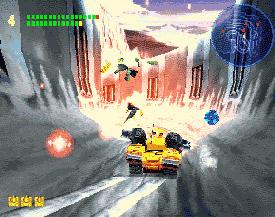It’s not the size of the tank, it’s how you use it.
As the FMV intro to Tiny Tank opens, we see Tiny, the cute protagonist
of the videogame tale, standing in a television studio shooting a commercial.
We hear the director in the background, ordering for the “Tinky tinky, clinky
clinky” theme song to be cued up. Tiny’s bright eyes glaze over as…











